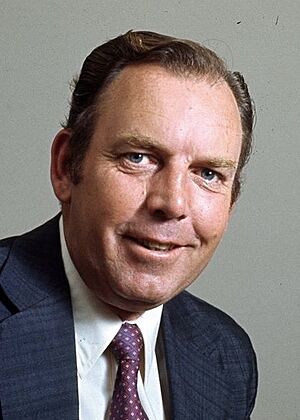Doug McClelland facts for kids
Quick facts for kids
Doug McClelland
|
|
|---|---|

McClelland in 1973
|
|
| President of the Senate | |
| In office 21 April 1983 – 23 January 1987 |
|
| Preceded by | Harold Young |
| Succeeded by | Kerry Sibraa |
| Special Minister of State | |
| In office 6 June 1975 – 11 November 1975 |
|
| Prime Minister | Gough Whitlam |
| Preceded by | Lionel Bowen |
| Succeeded by | Reg Withers |
| Minister for the Media | |
| In office 19 December 1972 – 6 June 1975 |
|
| Prime Minister | Gough Whitlam |
| Preceded by | New office |
| Succeeded by | Moss Cass |
| High Commissioner to the United Kingdom | |
| In office 21 March 1987 – March 1991 |
|
| Preceded by | Alfred Parsons |
| Succeeded by | Richard Smith |
| Senator for New South Wales | |
| In office 1 July 1962 – 23 January 1987 |
|
| Succeeded by | Sue West |
| Personal details | |
| Born | 5 August 1926 Wentworthville, New South Wales, Australia |
| Political party | Labor |
| Spouse | Lorna McNeill |
| Relations | Alfred McClelland (father) Robert McClelland (son) |
| Occupation | Court reporter, politician |
Douglas McClelland, born on August 5, 1926, is an Australian who had a long career in politics. He was a Senator for New South Wales from 1962 to 1987. He represented the Australian Labor Party (ALP).
During his time in government, he was the Minister for the Media from 1972 to 1975. He also served as the Special Minister of State in 1975. Later, he became the President of the Senate from 1983 to 1987. After leaving the Senate, he became Australia's High Commissioner to the United Kingdom from 1987 to 1991.
Doug McClelland is one of the longest-serving former Senators still alive today. He is also one of the last surviving ministers who worked under Prime Minister Gough Whitlam.
Contents
Early Life and Career
Growing Up in New South Wales
Doug McClelland was born on August 5, 1926, in Wentworthville, a suburb in western Sydney. His parents were Gertrude Amy and Alfred McClelland. His father was a farmer and also a politician for the Australian Labor Party. Alfred McClelland served in the Parliament of New South Wales for two terms.
Doug went to Wentworthville Public School. He then attended Parramatta High School and a business college in Parramatta. After finishing school, he worked as a clerk in the state Agriculture Department.
Serving in the Military
In 1944, just after his 18th birthday, Doug McClelland joined the Australian Imperial Force (AIF). He was stationed in different parts of Australia, including New South Wales, Queensland, and the Northern Territory. He was discharged from the military in January 1947, holding the rank of corporal.
After his military service, starting in 1949, he worked as a court reporter. He worked for both state and federal governments. During this time, he was an active member of the Australian Journalists Association.
Political Journey
Starting in Politics
Doug McClelland joined the Australian Labor Party (ALP) in 1947. In 1956, he was elected to the state executive committee of the party. He also worked as the campaign secretary for H. V. Evatt. Evatt was a close friend of Doug's father and a federal leader of the ALP.
McClelland was elected to the Senate in the 1961 federal election. He was 35 years old when his term as Senator began on July 1, 1962.
Key Roles in Government
Doug McClelland held several important positions in the Australian government. He was the Minister for the Media from December 19, 1972, to June 6, 1975. He also served as the Special Minister of State in 1975.
From 1981 until he left the Senate, he was known as the "Father of the Senate." This title is given to the longest-serving Senator.
Becoming President of the Senate
In August 1981, McClelland was elected Chairman of Committees in the Senate. This role also made him the Deputy President. He won this position with the help of the Australian Democrats party. This election helped set a new tradition where the opposition party holds this role.
When the ALP won the 1983 federal election, Doug McClelland was elected President of the Senate. He held this important role from April 21, 1983, until he resigned on January 23, 1987.
As President of the Senate, he helped create the Parliamentary Privileges Act 1987. This law helped define and protect the special rights and protections that members of parliament have. It was the first time a presiding officer introduced a bill in the history of the Australian Parliament.
McClelland retired from the Senate in January 1987. This was just before the new Parliament House opened in Canberra. He had been the chairman of the committee overseeing the new Parliament House since 1983.
Life After Politics
High Commissioner to the UK
After leaving the Senate, Doug McClelland continued to serve Australia. He became the Australian High Commissioner to the United Kingdom. This means he was Australia's top diplomat in the UK. He held this role from 1987 to 1991.
Family Life
Doug McClelland is married to Lorna McNeill. They have one son, Robert McClelland, who also became a politician. They also have two daughters.
In June 1987, Doug McClelland was honored as a Companion of the Order of Australia. This is a very high award in Australia.
He also received the Douglas Wilkie Medal in 1973. This award is given by the Anti-Football League for services to "non-football." He received it after he introduced a points system for television programming.
 | Kyle Baker |
 | Joseph Yoakum |
 | Laura Wheeler Waring |
 | Henry Ossawa Tanner |

